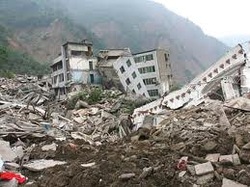

As a species, we've already outlasted many thousands of years of disease, famine, flood, predators, persecution, earthquakes and environmental change. So the odds remain in our favor.
The Higher Ground series of post-apocalyptic novels I co-wrote with Edith Parzefall shows how a group of survivors cope with the environment after civilization is destroyed.
But that hasn't happened yet.
Right now, an international team of scientists, mathematicians and philosophers at Oxford University's Future of Humanity Institute is investigating the biggest dangers. Dr Bostrom believes we've entered a new kind of technological era with the capacity to threaten our future as never before. These are threats we have no track record of surviving.
Experiments in areas such as synthetic biology, nanotechnology and machine intelligence are hurtling forward into the territory of the unintended and unpredictable. Although synthetic biology promises great medical benefits, unforeseen consequences could come from manipulating the boundaries.
As well as the use of destructive nanotechnology in warfare, there are also fears about how artificial or machine intelligence interact with the external world. See the full story here.
Such computer-driven intelligence might be a powerful tool in industry, medicine, agriculture or managing the economy. However, computers could create more and more powerful generations of computers.
The potential of building things that could go wrong or outgrow our mentality at a frightening speed, fills me with horror. My novels' band of adventurers refer to the artifacts Tech sheens—like the round, shiny disc reflecting rainbow colors they find buried in the dirt. "Tech sheens didn't do people much good in the before times."

 RSS Feed
RSS Feed






